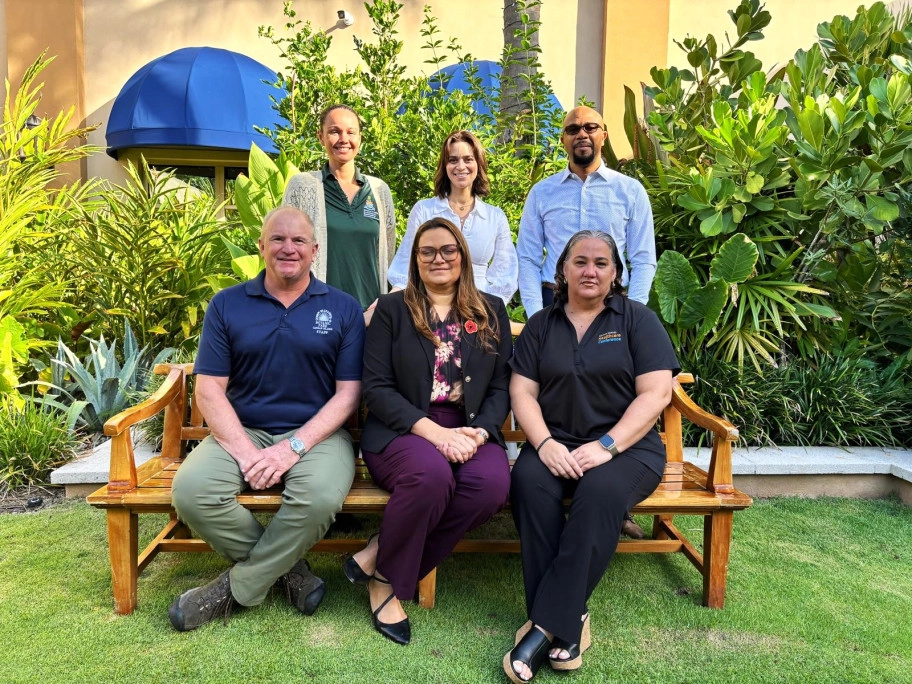MHES Receives Grant to Propagate Native Plants
The Ministry of Health, Environment and Sustainability (MHES) is pleased to announce its achievement of a Darwin Plus Local Grant to propagate native plants at the Queen Elizabeth II Botanic Park.
Darwin Plus is a government scheme under the UK Biodiversity Challenge Fund that helps to deliver long-term strategic outcomes for biodiversity conservation and climate change resilience within the UK Overseas Territories.
The MHES grant proposal aims to deliver strategic improvements to existing nursery facilities at the Botanic Park, enabling its horticultural team to grow a minimum of 250 plants comprised of a mix of 10 native species. The grant was approved in late August and work on the project is set to start in October 2025.
“This exciting project has the potential of transforming the availability, access, sustainability and visibility of these native and endemic species,” explains Acting Deputy Chief Officer Hannah Reid. “It will support delivery of the Ministry’s National Tree Planting Programme (NTPP), as out of the initial 250 plants, 100 plants will be reserved for tree plantings as a part of this programme. Over the long term, this project will help the Park’s nursery sustain itself in the local market, increasing the availability of native species for use in conservation projects and local landscaping,” she adds.
In its approval letter, the Darwin Plus Local Applications Team recognised the Ministry’s “strong application that clearly articulates the aim to enhance cultivation and planting of native trees and plants in Cayman with realistic targets to grow at least 250 native plants”.
The capacity building and public engagement components of the project were also highlighted as a strength of the project, as well as the relationship between the MHES, its departments, other Government agencies and the National Trust for the Cayman Islands.
"This project is an important step toward making more native plants more widely available to the public, reducing reliance on imported species and creating real opportunities to reintroduce these plants into the local landscape,” adds John Lawrus, General Manager of the Queen Elizabeth II Botanic Park. “By restoring native habitats—even in reclaimed areas not intended for human settlement—we not only provide greater value for wildlife, but also preserve our cultural identity through the plants that define Cayman and the greater region. There are many partners working to bring this vision to life, and I know that we are working towards a shared goal: improving the environment around us and enhancing our own well-being, as there is immeasurable value in spending time among nature.”
Hon. Katherine Ebanks-Wilks, Minister for Health, Environment & Sustainability, said: “We are very excited to receive the news that our grant proposal has been accepted. This project, and the National Tree Planting Programme as a whole, is more than ‘just trees’; it goes to the core of who we are as a people. Many have already heard me state how our health and our environment are inextricably linked, which is true for every human around the world. When it comes to Cayman, preservation and protection are particularly important to all of us. Ease of access to our native and endemic plants play a key role in the preservation of our culture and heritage. This connection to our roots – literal and figurative – gives us a sense of meaning and identity that are vital for good mental health.”
“I am very proud of the work of our Ministerial team in securing this grant,” adds Chief Officer Tamara Ebanks. “I am grateful to our Acting DCO, Hannah Reid, and her policy team, Morgan Golden-Ebanks and Emily Gilman for their hard work on this successful application, as well as John Lawrus and Corin Golding from the Botanic Park team for their expertise and willingness to partner with our Ministry on this important project. We are also indebted to the Department of Education Services, the Department of Environment, the Cayman Islands National Attractions Authority, and the National Trust for the Cayman Islands for their letters in support of this application. This is a true partnership between stakeholders, and I know that my team will continue to engage community partners, gardening enthusiasts, and other established and budding conservationists as the work progresses.”
For more information on this project, or to learn how to get involved, visit https://www.gov.ky/national-tree-planting/
Latest News
-
Legal Services Act to Be Fully Commenced 1 January 2026Police/Cou...27 November 2025, 05:10 AM
-
Police Conduct Day of Action in Cayman BracPolice/Cou...27 November 2025, 05:05 AM
-
Cayman Islands Chamber of Commerce Launches 2025 Mentoring Cayman Programme at Opening ReceptionEducation27 November 2025, 05:02 AM
-
MHES Issues Travel Advisory on Leptospirosis Outbreak in JamaicaHealth27 November 2025, 04:57 AM
-
Aircraft larviciding under way across the Cayman IslandsHealth, Env...27 November 2025, 04:56 AM


